1. Playing career
David Moyes' playing career primarily saw him as a centre-back, making over 530 league appearances across several clubs in Scotland and England.
1.1. Club career
Moyes began his youth career in 1978 with the Icelandic club ÍBV, playing half a season with their youth team. He then played for Drumchapel Amateurs from 1978 to 1980.
1.1.1. Celtic
Moyes started his professional career at Celtic in 1980, where he won a championship medal in the 1981-82 Scottish Premier Division. He made 24 league appearances for the club before departing in 1983.
1.1.2. Cambridge United
From 1983 to 1985, Moyes played for Cambridge United, making 79 appearances and scoring 1 goal. During his time at Cambridge United, Moyes, a practicing Christian, faced abuse from teammate Roy McDonough regarding his religious beliefs. McDonough felt that Moyes, along with Alan Comfort and Graham Daniels, were overly focused on their faith in the changing room instead of preparing for games. Following a 3-3 draw against Wigan Athletic in March 1985, McDonough reportedly physically assaulted Moyes for what he perceived as a lack of effort.
1.1.3. Bristol City
Moyes spent two years with Bristol City from 1985 to 1987, where he made 83 appearances, scored 6 goals, and won the 1985-86 Associate Members' Cup.
1.1.4. Shrewsbury Town
Between 1987 and 1990, Moyes played for Shrewsbury Town, making 96 appearances and scoring 11 goals. While playing for Shrewsbury Town in 1987, Moyes began coaching at the nearby private school, Concord College, on the recommendation of Jake King as a way to supplement his wages.
1.1.5. Dunfermline Athletic
Moyes made over 100 appearances for Dunfermline Athletic between 1990 and 1993, scoring 13 goals. He also started in the 1991 Scottish League Cup final, where Dunfermline Athletic were runners-up.
1.1.6. Preston North End
After a brief spell with Hamilton Academical in 1993, Moyes joined Preston North End later that year, where he concluded his playing career. He made 143 appearances for Preston, scoring 15 goals. During his time as a player, Preston won the 1995-96 Football League Third Division title. He transitioned into coaching at Preston, working his way up to assistant manager before taking over as manager in 1998.
1.2. International career
David Moyes captained the Scotland national team at the under-18 age group level in 1980, playing under former UEFA Technical Director Andy Roxburgh.
2. Managerial career
David Moyes' managerial career began in 1998 at Preston North End, where he quickly established a reputation for building competitive teams. His career has seen him manage several clubs in the English Premier League, as well as a stint in Spain, before his recent return to Everton.
2.1. Preston North End
Moyes took over as manager of Preston North End in January 1998, replacing Gary Peters. At the time, the club was struggling in Division Two and facing relegation. Moyes had been preparing for management throughout much of his playing career, obtaining coaching badges at the age of 22 and meticulously compiling notes on the techniques and tactics of managers he had played under.
Preston successfully avoided relegation at the end of the 1997-98 season. The following season, they reached the Division Two play-offs, where they were defeated by Gillingham in the semi-final stage. In the 1999-2000 season, Moyes guided Preston to the Division Two title, securing promotion to Division One. A significant achievement was then steering Preston to the Division One play-offs the very next season, largely with the same squad. However, Preston lost 3-0 to Bolton Wanderers in the 2001 Football League First Division play-off final, missing out on promotion to the Premier League. One month later, Moyes signed a new five-year contract with the club. In 2001, while studying for his UEFA Pro License, Moyes shadowed Roy Hodgson at Udinese during Hodgson's six-month spell at the club. Towards the end of the following season, in March 2002, he departed Preston to take over from fellow Scotsman Walter Smith at Everton. Moyes managed Preston for 234 matches, achieving 113 wins, 58 draws, and 63 losses.
2.2. Everton
Moyes' first tenure as manager of Everton was his longest and most impactful, lasting over a decade and establishing him as a respected figure in English football.
2.2.1. Early years (2002-2004)
Moyes joined Everton on 14 March 2002. At his unveiling press conference, he famously declared Everton to be 'The People's Club' on Merseyside, stating: "I am from a city (Glasgow) that is not unlike Liverpool. I am joining the people's football club. The majority of people you meet on the street are Everton fans. It is a fantastic opportunity, something you dream about. I said 'yes' right away as it is such a big club." His first match in charge was two days later, a 2-1 victory against Fulham at Goodison Park, with David Unsworth scoring within 30 seconds. Everton maintained a good run of form under Moyes, successfully avoiding relegation, which had been a genuine threat upon his appointment. Despite Everton's rich history and numerous honors, the preceding decade had been largely unsuccessful for the club, with only an FA Cup win in 1995 and a sixth-place finish in 1996 as notable highlights.
For his first full season in charge, the 2002-03 season, Moyes strengthened the squad by signing Chinese international Li Tie, Nigerian defender Joseph Yobo, and goalkeeper Richard Wright, while releasing older players like Jesper Blomqvist and David Ginola. On 12 April 2003, Moyes was sent to the stands during a game against West Bromwich Albion for using foul and abusive language towards referee Steve Bennett. Everton narrowly missed out on UEFA Cup qualification on the final day of the season, finishing seventh after a defeat to Manchester United. Moyes' efforts were recognized with his first LMA Manager of the Year award, in addition to the Premier League Manager of the Month award for November 2002, a period when Everton was in the Champions League places.
The 2003-04 season saw Moyes bring in Kevin Kilbane from Sunderland, James McFadden from Motherwell, Nigel Martyn from Leeds United, and a loan return for Francis Jeffers from Arsenal. However, the team endured a poor run of results, failing to win a game in 2004 until 28 February. A reported confrontation between Moyes and Duncan Ferguson at the training ground highlighted the club's internal issues. Everton finished 17th with 39 points, their lowest total in club history until the 2022-23 season, though their survival was secured earlier.
2.2.2. Mid-career (2004-2009)
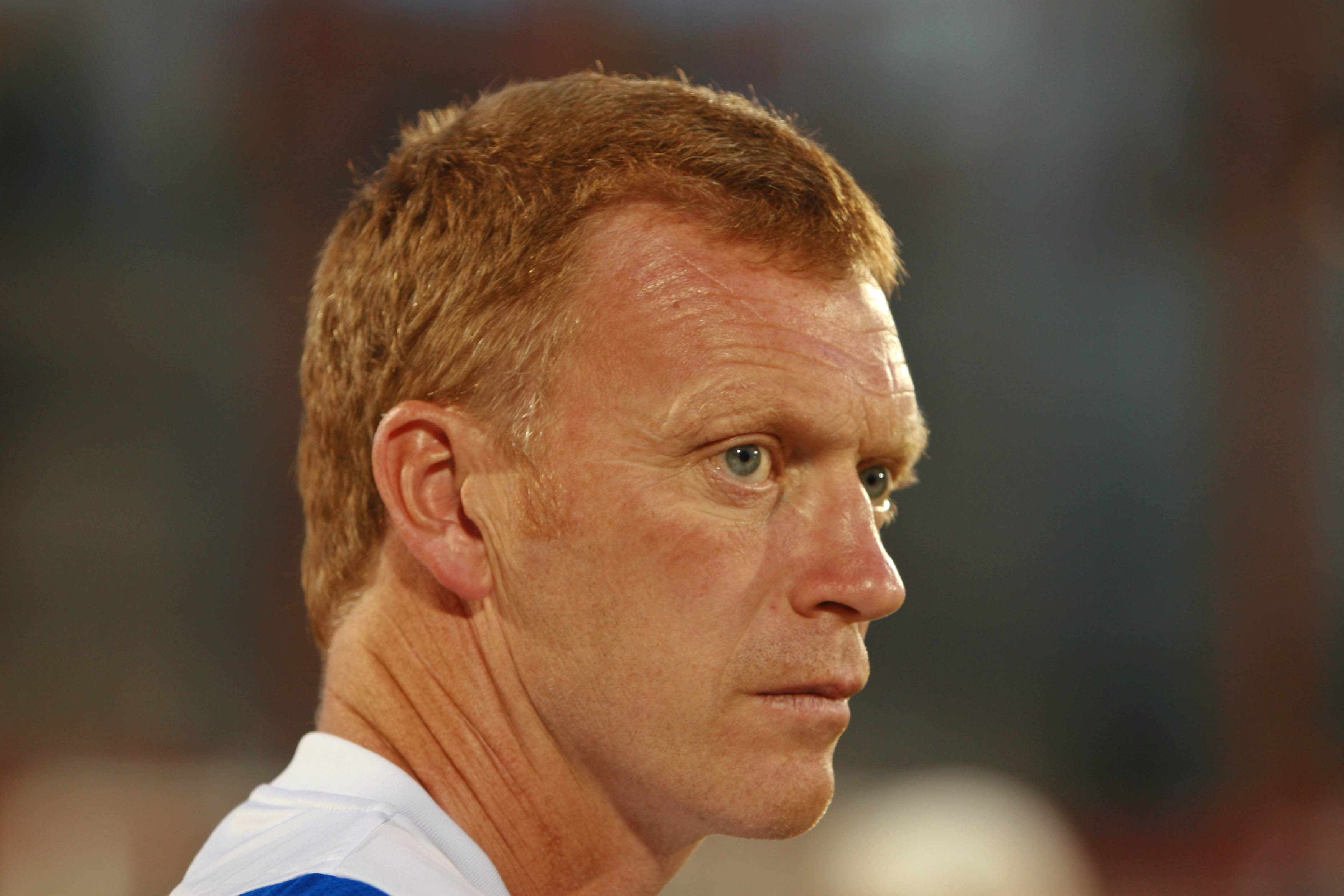
Despite the previous season's struggles, Moyes made significant moves in the summer of 2004, acquiring Tim Cahill and Marcus Bent. Cahill proved to be one of Moyes' most successful signings, scoring 15 goals in his debut season. Key departures included Tomasz Radzinski, Tobias Linderoth, David Unsworth, and most notably, Wayne Rooney, who joined Manchester United for a reported 25.60 M GBP. Later, the Daily Mail published excerpts from Rooney's autobiography, claiming Moyes had forced Rooney out and leaked details to the press. Moyes sued for libel and settled out of court after Rooney apologized and agreed to pay damages, which Moyes donated to the Everton Former Players' Foundation.
In the 2004-05 season, Everton defied expectations by finishing fourth in the league, securing a spot in the UEFA Champions League third qualification round. Moyes received his second LMA Manager of the Year award. In January, he broke Everton's transfer record to sign striker James Beattie, and after influential midfielder Thomas Gravesen departed, Mikel Arteta joined on loan, later made permanent.
The 2005-06 season saw Everton struggle again, battling relegation. Their Champions League bid ended with a loss to Villarreal in the qualifying round, and they were defeated 5-1 by FC Dinamo București in the first round of the UEFA Cup. Moyes signed Nuno Valente, Andy van der Meyde, Simon Davies, Per Krøldrup, and Phil Neville, and secured Matteo Ferrari on loan. The team climbed from the bottom of the table in late October to finish a secure 11th.
Moyes broke the club transfer record for a second time at the start of the 2006-07 season with the 8.60 M GBP acquisition of Andrew Johnson. Joleon Lescott was also signed from Wolverhampton Wanderers, and goalkeeper Tim Howard arrived on loan from Manchester United, later made permanent. These signings proved successful, further enhancing Moyes' reputation as a team builder. While Everton's league form improved, their FA Cup record did not, as they crashed out 4-1 to Blackburn Rovers in the third round. An improved league position of sixth was secured, earning UEFA Cup qualification for the next season.
The 2007-08 season marked a period of consistency and stability for Everton under Moyes. They secured fifth place in the league, reached the semi-final of the Football League Cup, and the last 16 of the UEFA Cup, where they were eventually beaten on penalties by Fiorentina. Moyes also signed four more key players: Yakubu for a record 11.25 M GBP, Steven Pienaar for 2.05 M GBP (after an initial loan), Phil Jagielka for 4.00 M GBP, and Leighton Baines for a fee that could rise to 6.00 M GBP. This period of strong performances and consistent league finishes (15th, 7th, 17th, 4th, 11th, and 6th in previous seasons) instilled optimism. Moyes' reputation as a disciplinarian was reflected in Everton's low yellow card count, receiving only 27 bookings all season, the lowest in the league.
For the 2008-09 season, Moyes recruited Steve Round as his assistant manager. Early signings included Lars Jacobsen, Segundo Castillo, and Louis Saha, followed by goalkeeper Carlo Nash on a free transfer and Marouane Fellaini for a club record 15.00 M GBP. On 14 September, Moyes was sent off during a game against Stoke City and later fined 5.00 K GBP by The Football Association for improper conduct. In January 2009, Moyes brought in Brazilian international striker Jô on loan from Manchester City. On 14 October 2008, Moyes agreed to a five-year contract extension at Goodison Park. On 19 April 2009, Moyes led Everton to an FA Cup semi-final victory over Manchester United via a penalty shoot-out, reaching the final for the first time since 1995. In their only final appearance under Moyes, Everton were beaten 2-1 by Chelsea, despite an opening minute goal from Louis Saha.
2.2.3. Later years (2009-2013)

In the summer of 2009, Moyes sold Joleon Lescott to Manchester City for 22.00 M GBP after a prolonged transfer saga. With the funds, Moyes signed Johnny Heitinga, Sylvain Distin, and Diniyar Bilyaletdinov. He also re-signed Jô on a season-long loan and Lucas Neill on a free transfer. Moyes was named Premier League Manager of the Month for January 2010 after three wins and a draw. On 6 February 2010, Moyes managed his 600th career match in the Merseyside Derby against Liverpool, which ended in a 1-0 defeat. Everton finished the season in eighth place, failing to qualify for Europe for the first time in four years, despite a strong run of only two defeats in their last 24 league games.
In May 2010, Moyes expressed interest in managing Celtic in the future, but he did not put his name forward for the vacancy that arose later that month, and Neil Lennon was appointed instead. In August 2010, Moyes dismissed speculation linking him with the manager's job at Aston Villa. In September 2010, Moyes admitted to an improper conduct charge related to his behavior towards referee Martin Atkinson following a 3-3 draw with Manchester United, resulting in an 8.00 K GBP fine for him and his assistant, Steve Round.
In January 2012, Moyes became the fourth manager, after Alex Ferguson, Arsène Wenger, and Harry Redknapp, to record 150 wins in the Premier League. He celebrated his 400th Premier League game in November 2012 with a 2-1 win against Sunderland. Upon reaching his 10th anniversary at Everton, Moyes received praise from fellow managers including Sir Alex Ferguson, Arsène Wenger, and Kenny Dalglish for his achievements. His service to Everton was also commended in the Parliament by Steve Rotheram MP.
On 9 May 2013, with his contract expiring at the end of the season, Moyes informed Everton that he would leave the club to succeed Ferguson as manager of Manchester United. Three days later, Moyes managed his final game at Goodison Park, receiving a guard of honour from his players and banners from fans expressing gratitude and well wishes. He described the reception as "really emotional" and "gobsmacked and thankful and humbled."
Despite his long tenure, Moyes faced some criticism at Everton. Some fans dubbed him "Dithering Dave" due to perceived indecisiveness, particularly concerning transfers. Another point of criticism was his poor away record against the "Big Four" Premier League teams (Manchester United, Chelsea, Arsenal, and Liverpool). In 43 matches at their respective stadiums, his Everton team failed to secure a single victory.
2.3. Manchester United
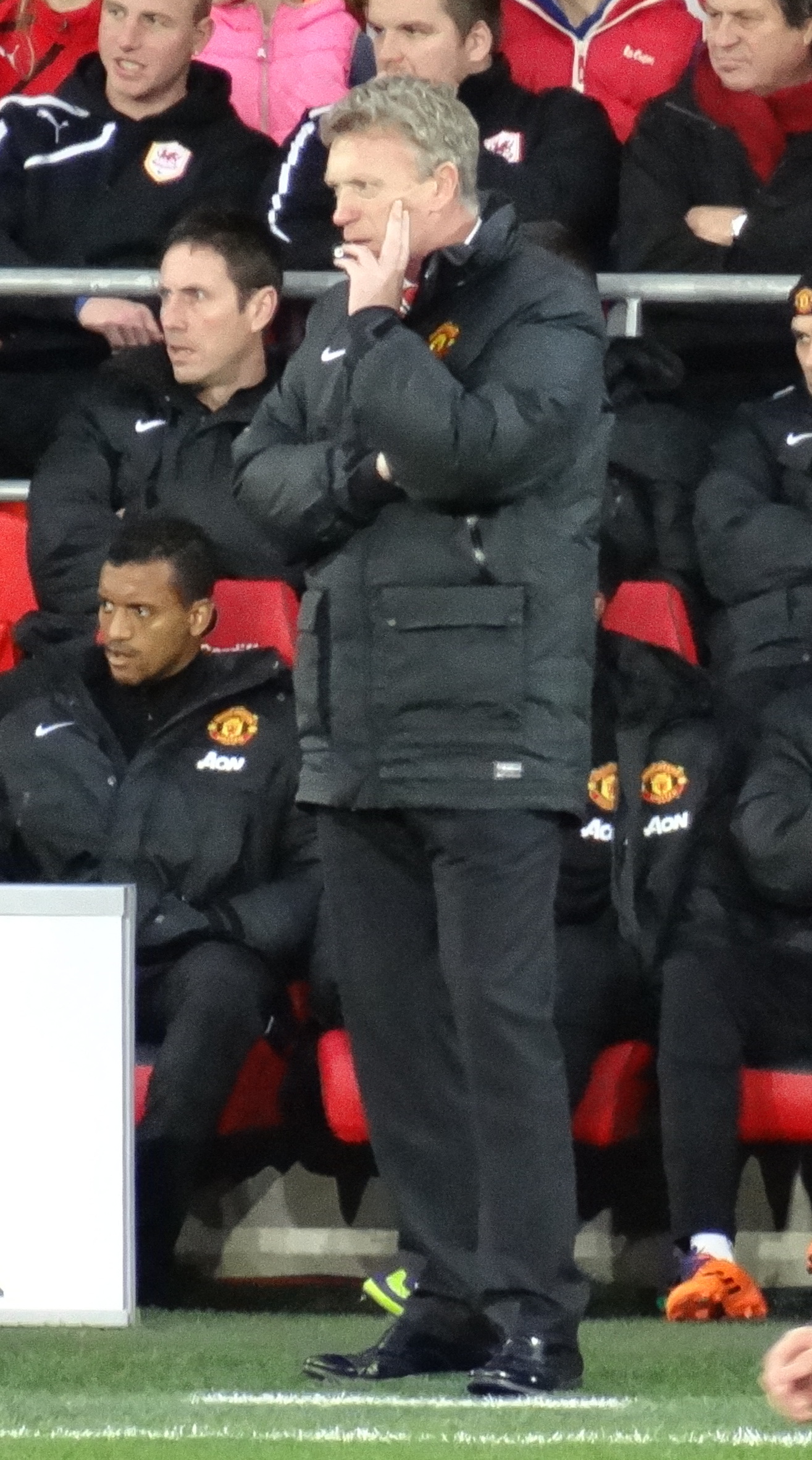
Moyes officially began his six-year contract with Manchester United on 1 July 2013, having been personally chosen by Sir Alex Ferguson as his successor. A banner at Old Trafford famously read "The Chosen One" in recognition of this. His first unofficial game as United manager resulted in a 1-0 defeat to Singha All Stars in Bangkok on 13 July 2013. However, he secured his only trophy with Manchester United in his first official game, a 2-0 victory over Wigan Athletic in the FA Community Shield on 11 August 2013. This made him the first United manager in history to win a trophy outright in his debut season.
Less than a week later, he won his first league game, a 4-1 victory against Swansea City. However, United then suffered their worst start to a Premier League season, including a 1-0 defeat at Liverpool, a 4-1 defeat at Manchester City, and a 2-1 home defeat by West Bromwich Albion (United's first home loss to West Brom since 1978). These early results led journalists to describe his reign as "calamitous" and highlighted the immediate pressure he faced. On 2 September 2013, Moyes reunited with his former player, signing Marouane Fellaini on a four-year contract for 27.50 M GBP on deadline day.
In December, Manchester United experienced back-to-back home league defeats for the first time since the 2001-02 season, losing to Everton (their first home defeat to Everton in 21 years) and Newcastle United (their first home defeat to Newcastle in 41 years) within four days. After 15 games, United were ninth in the table, 13 points behind leaders Arsenal. Moyes took "complete responsibility" for the defeats, expressing confidence in his team's improvement. Despite domestic struggles, he had a positive start to his first Champions League campaign, with United finishing top of their group after winning four of six group stage matches.
In January 2014, United were knocked out of the FA Cup in the third round, losing 2-1 at home to Swansea City (Swansea's first ever win at Old Trafford). They also lost in the semi-final of the Football League Cup after a penalty shoot-out against Sunderland. In February, United lost 2-1 at Stoke, marking Stoke's first win over United in 30 years. Following consecutive 0-3 home defeats against Liverpool and Manchester City, a "Wrong One - Moyes Out" banner was flown over Old Trafford by United fans during a home match against Aston Villa in March. Moyes stated that the majority of fans remained "very supportive" after United won the match 4-1. The club reached the quarter-final stage of the Champions League, defeating Olympiacos, but were eliminated 4-2 on aggregate by Bayern Munich. Moyes also signed Juan Mata in January for 37.10 M GBP.
On 20 April 2014, United lost 2-0 at Everton, marking the first time Everton had beaten United both home and away in 44 years. Two days later, on 22 April 2014, Manchester United announced Moyes' sacking. His tenure lasted 10 months, making it the third-shortest managerial stint in United history and the shortest in 82 years, despite calls from former Manchester United players like Denis Law and David Beckham for him to be given more time. At the time of his dismissal, United were seventh in the Premier League, 13 points behind fourth-placed Arsenal with four matches remaining, meaning they would fail to qualify for the Champions League for the first time since 1995 and finish outside the top three in Premier League history. Moyes had secured only 5 points from a possible 24 against the top four teams at the time of his sacking (Liverpool, Chelsea, Manchester City, and Arsenal). He was replaced by interim player-manager Ryan Giggs, and permanently by Louis van Gaal. Moyes received 5.00 M GBP in compensation following his sacking.
Moyes was criticized for a perceived defeatist attitude during his time at United. He referred to rivals Liverpool as "favourites" ahead of their trip to Old Trafford, a comment that Liverpool manager Brendan Rodgers publicly countered. Moyes also stated that Manchester City, their city rivals, were "at the sort of level we are aspiring to." The Manchester Evening News described Moyes' appointment as Ferguson's second biggest mistake, stating, "Moyes never sounded or managed like a United manager. United got an Everton manager, Everton coaches, an Everton player and achieved an Everton finish; seventh."
2.4. Real Sociedad
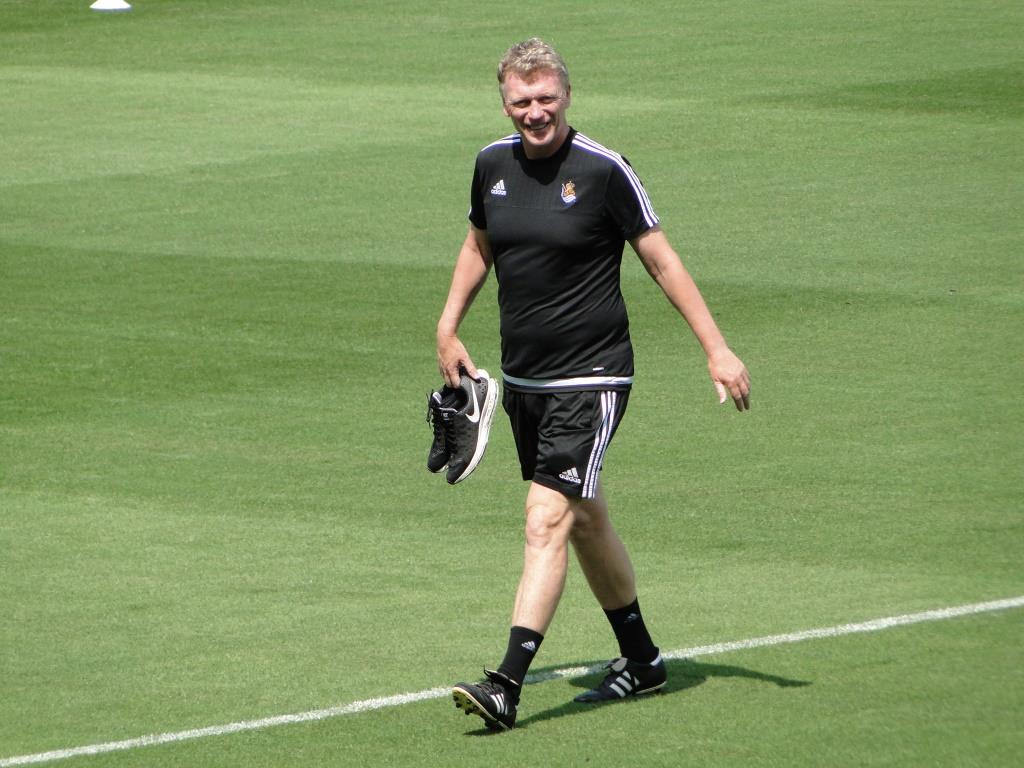
On 10 November 2014, Moyes was appointed as the new head coach of La Liga club Real Sociedad on an 18-month deal, succeeding Jagoba Arrasate with the team in 15th place. His managerial debut was a goalless draw away to Deportivo La Coruña on 22 November. Six days later, in his first home match at Anoeta, he secured his first victory as the club's coach, a 3-0 win over Elche with Carlos Vela scoring a hat-trick. On 4 January 2015, Moyes led Sociedad to a significant 1-0 win over Barcelona, a result that journalists compared favorably to his management of Everton and contrasted with his struggles at Manchester United. Ten days later, in a 2-2 home draw against Villarreal that eliminated his team from the Copa del Rey, Moyes was sent off and later received a two-match touchline ban for arguing an offside decision.
Moyes successfully steered Real Sociedad away from the relegation zone, finishing the 2014-15 season in 12th place. However, after a poor start to the 2015-16 season, he came under increasing pressure and was sacked on 9 November 2015. At the time of his dismissal, the team was in 16th place with only 9 points from their last 5 matches, having won only one.
2.5. Sunderland
On 23 July 2016, Moyes was appointed as the replacement for Sam Allardyce as manager of Sunderland, marking his return to the Premier League since his departure from Manchester United in April 2014.
On 3 April 2017, it was revealed that Moyes had made a controversial remark after a post-match interview following Sunderland's goalless draw with Burnley on 18 March. While the microphone was still audible, Moyes told BBC reporter Vicki Sparks: "It was getting a wee bit naughty at the end there so just watch yourself. You still might get a slap even though you're a woman. Careful the next time you come in". Moyes later apologized for the incident, and The FA requested his observations. In June of that year, he was fined 30.00 K GBP for the comments, a decision upheld by an independent panel the following month.
Sunderland were confirmed to be relegated to the EFL Championship for the first time in ten years on 29 April 2017, after a 1-0 loss to AFC Bournemouth, marking the first relegation of Moyes' career. After the match, he expressed a desire to remain as manager. However, on 22 May, one day after the end of the Premier League season, Moyes resigned without compensation.
2.6. West Ham United
Moyes had two distinct tenures as manager of West Ham United, with his second stint proving to be significantly more successful.
2.6.1. Initial stint (2017-2018)
Moyes was appointed manager of West Ham United on 7 November 2017, with the team in the relegation zone. His first game in charge, also his 500th Premier League game, resulted in a 2-0 loss away to Watford on 19 November. On 9 December, he secured his first win as Hammers manager, a 1-0 victory over reigning champions Chelsea at the London Stadium, with Marko Arnautović scoring the lone goal. On 13 January 2018, West Ham achieved a 4-1 away win against Huddersfield, which marked Moyes' 200th victory as a Premier League manager. He became only the fourth manager to reach this milestone, after Sir Alex Ferguson, Arsène Wenger, and Harry Redknapp. Following a 2-0 win at Leicester City on 5 May 2018, with two games remaining in the season, Moyes successfully guided West Ham to Premier League survival for the 2017-18 season. His six-month deal with West Ham expired on 13 May 2018, and he left the club shortly after.
2.6.2. Second stint (2019-2024)
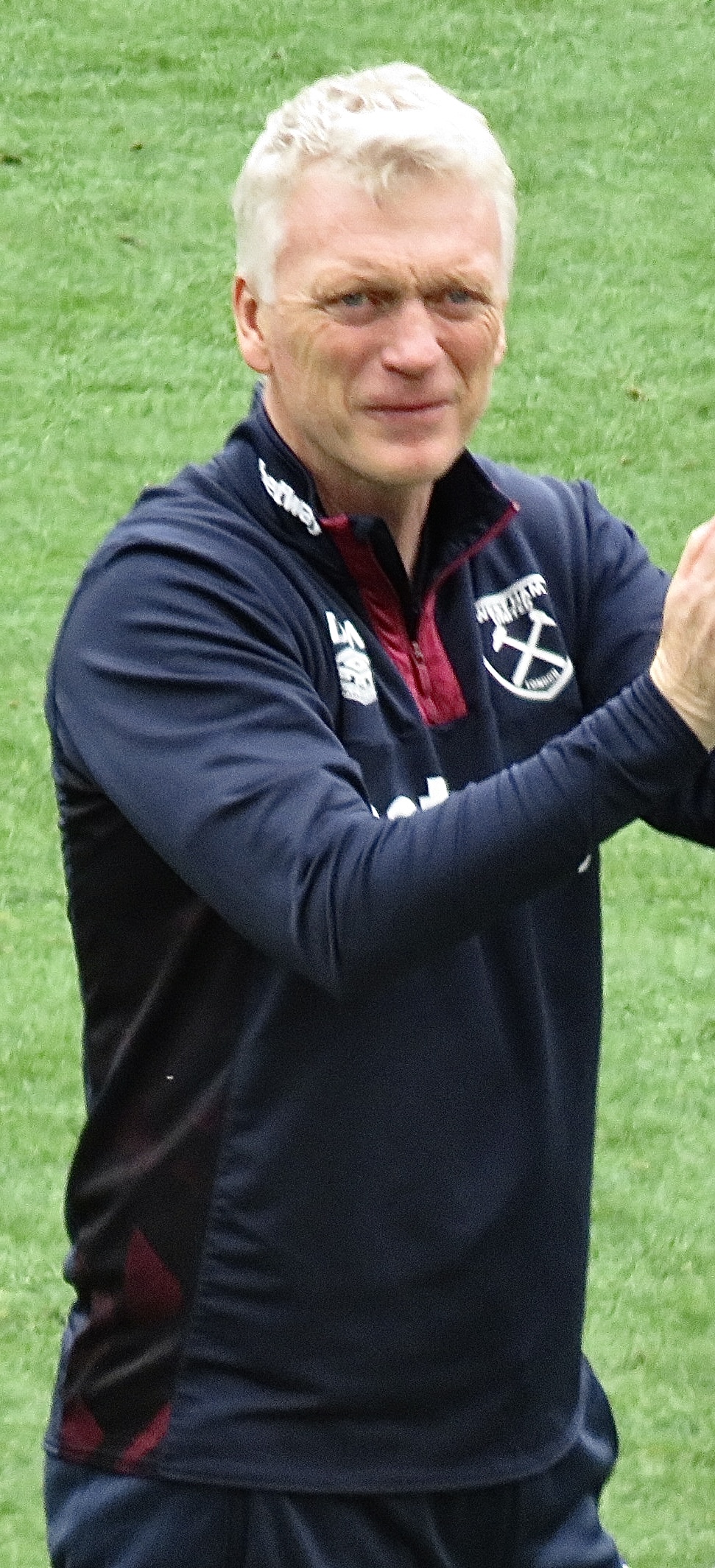
On 29 December 2019, Moyes returned to his previous position as the manager of West Ham United on an 18-month contract, replacing Manuel Pellegrini, who had left the club in 17th place in the Premier League, just one point above the relegation zone. Speaking about his return, Moyes stated, "I think there's only two or three managers with a better Premier League win record. That's what I do, I win. I'm here to get West Ham wins and get them away from the bottom three."
His first game back resulted in a dominant 4-0 win against Bournemouth in the Premier League on 1 January 2020. West Ham finished the 2019-20 season in 16th place with 39 points, their lowest tally since 2010-11. Moyes' 19 games in charge during this period yielded 20 points, one more than the previous 19 games managed by Manuel Pellegrini.
In the 2020-21 season, Moyes guided West Ham to a club-record Premier League points total of 65, finishing in sixth place and qualifying for the 2021-22 UEFA Europa League. The team achieved 19 Premier League wins, including nine away victories, both new club records. Due to these strong performances, some West Ham supporters affectionately nicknamed him "Moyesiah". In June 2021, Moyes signed a new three-year contract with West Ham. He also managed his 1,000th game as a manager on 5 November 2021, in a 2-2 draw against Genk in the Europa League.
In the 2021-22 season, Moyes led West Ham to a top-seven finish and a Europa League semi-final, where they lost 3-1 on aggregate to Eintracht Frankfurt. This marked the first time in club history that West Ham finished in the top seven in back-to-back seasons.
In the 2022-23 season, Moyes led the club to victory in the 2023 UEFA Europa Conference League final against Fiorentina, finishing the tournament undefeated with 12 wins and one draw. This triumph secured the club's first major European trophy in 58 years. However, West Ham finished the Premier League season in 14th place, the lowest table position for any team winning a European trophy.
In February 2024, amidst calls from some supporters for his replacement, Moyes stated he had been offered a new contract but would wait until the end of the season to decide. In April 2024, after further criticism from some fans regarding his perceived negative style of play, West Ham confirmed that a decision on his future contract would be made at the season's end. On 6 May 2024, West Ham officially announced that Moyes would depart the club at the conclusion of his contract at the end of the 2023-24 season.
2.7. Return to Everton
On 11 January 2025, Moyes returned to Everton for a second time, signing a two-and-a-half-year contract. He replaced previous manager Sean Dyche, who had left the club in 16th place in the league, one point above the relegation zone. On 19 January 2025, Moyes guided Everton to their first win in six Premier League matches, securing a 3-2 victory at home against Tottenham Hotspur.
3. Managerial statistics
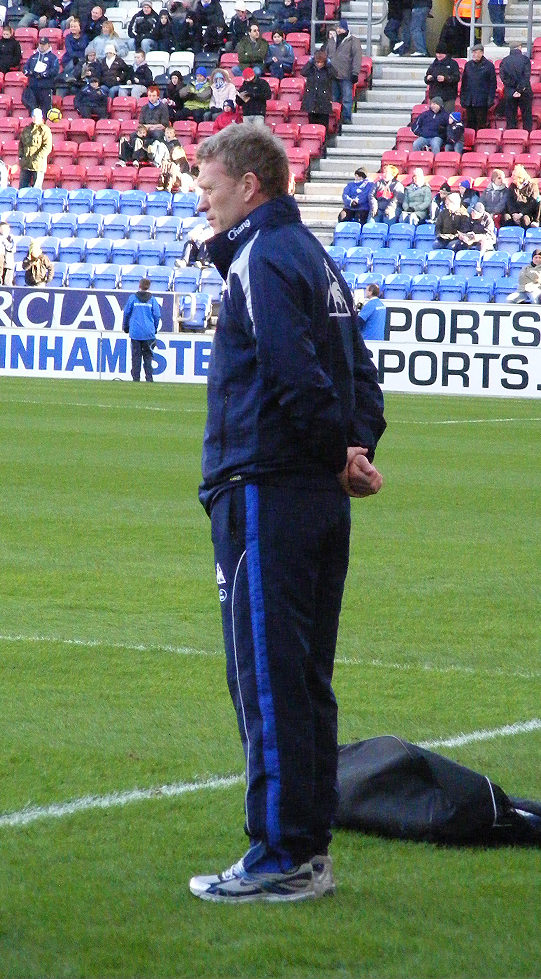
| Team | From | To | Matches played | Matches won | Matches drawn | Matches lost | Win % |
|---|---|---|---|---|---|---|---|
| Preston North End | 12 January 1998 | 14 March 2002 | 234 | 112 | 60 | 62 | 47.86 |
| Everton | 14 March 2002 | 30 June 2013 | 518 | 218 | 139 | 161 | 42.08 |
| Manchester United | 1 July 2013 | 22 April 2014 | 51 | 27 | 9 | 15 | 52.94 |
| Real Sociedad | 10 November 2014 | 9 November 2015 | 42 | 12 | 15 | 15 | 28.57 |
| Sunderland | 23 July 2016 | 22 May 2017 | 43 | 8 | 7 | 28 | 18.60 |
| West Ham United | 7 November 2017 | 13 May 2018 | 31 | 9 | 10 | 12 | 29.03 |
| West Ham United | 29 December 2019 | 19 May 2024 | 231 | 103 | 45 | 83 | 44.59 |
| Everton | 11 January 2025 | Present | 9 | 4 | 3 | 2 | 44.44 |
| Total | 1159 | 493 | 288 | 378 | 42.54 | ||
4. Honours
David Moyes has achieved several honours both as a player and as a manager throughout his football career, alongside individual recognitions for his contributions to the sport.
4.1. Player
Celtic
- Scottish Premier Division: 1981-82
Bristol City
- Associate Members' Cup: 1985-86
Dunfermline Athletic
- Scottish League Cup runners-up: 1991-92
Preston North End
- Football League Third Division: 1995-96
4.2. Manager
Preston North End
- Football League Second Division: 1999-2000
Everton
- FA Cup runners-up: 2008-09
Manchester United
- FA Community Shield: 2013
West Ham United
- UEFA Europa Conference League: 2022-23
4.3. Individual
- LMA Manager of the Year: 2002-03, 2004-05, 2008-09
- Premier League Manager of the Month: November 2002, September 2004, January 2006, February 2008, February 2009, January 2010, March 2010, October 2010, September 2012, March 2013
- London Football Awards Manager of the Year: 2021, 2022
5. Personal life
David Moyes' personal life reflects his Scottish roots, strong Christian faith, and engagement with social and political issues, alongside his commitment to community service.
5.1. Early life and background
Moyes was born on 25 April 1963 and grew up in the Thornwood area of Glasgow, Scotland, before his family relocated to the nearby town of Bearsden in East Dunbartonshire. His father, David Sr., was a scout at Everton and had previously coached at Drumchapel Amateurs, where Moyes began his football career. David Sr.'s full-time occupation was as a pattern-maker and later a lecturer at Anniesland College in North Glasgow. Moyes' mother, Joan, hailed from Portrush in Northern Ireland and worked in clothes stores in Glasgow. His cousin, Dessie Brown, serves as the secretary of Coleraine Football Club. Moyes' nephew, Ewan Moyes, is also a former footballer who played for Livingston.
5.2. Faith, politics, and activism
Moyes is a devout Christian. While playing for Cambridge United, he would often discuss religion with teammates Alan Comfort and Graham Daniels. Although he is generally reluctant to discuss his faith in interviews, it has been noted as a significant aspect of his life.
Moyes is a supporter of the Labour Party. In 2010, he publicly backed Andy Burnham for leadership in the Labour Party leadership election. During the 2014 Scottish independence referendum, he supported the Better Together campaign, advocating against Scottish independence. In April 2021, Moyes expressed support for the idea of merging the English and Scottish football league pyramids and expanding the Premier League into two divisions.
During the COVID-19 pandemic in April 2020, Moyes accepted a 30% salary cut at West Ham to help the club retain jobs and pay 100% of non-playing staff salaries. He also volunteered in his home village in Lancashire, delivering fruit and vegetables to those in need. On 22 September 2020, Moyes, along with players Josh Cullen and Issa Diop, tested positive for COVID-19 shortly before an EFL Cup fixture against Hull City, causing him to leave the ground before the game. His place was temporarily taken by Alan Irvine. He returned a second positive test three three days later.
5.3. Other activities
Moyes co-owns the racehorse Desert Cry, which was trained by Ginger McCain.
5.4. Honorary awards and recognition
In 2005, Moyes received an honorary fellowship from Myerscough College near Preston. In December 2017, he was awarded another honorary fellowship from the University of Central Lancashire. In the 2025 New Year Honours, Moyes was appointed an Officer of the Order of the British Empire (OBE) for his services to football.
6. Commentary Work
David Moyes has also engaged in football media as a commentator. During the 2010 FIFA World Cup in South Africa, he provided commentary for selected matches for BBC Radio 5 Live. In May 2024, Talksport announced Moyes as part of their broadcast team covering Euro 2024 in June and July 2024. He was also part of the BBC's team for Euro 2024.